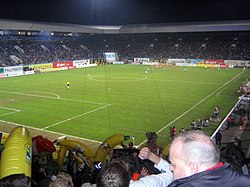 Ostseestadion in June 2014 | |
 | |
| Full name | Ostseestadion |
|---|---|
| Former names | Ostseestadion (1954-2007) DKB-Arena (2007-2015) |
| Location | Rostock, Mecklenburg-Vorpommern, Germany |
| Owner | Ostseestadion GmbH & Co. KG |
| Operator | Ostseestadion GmbH & Co. KG |
| Capacity | 17,000 (1954) 25,500 (1991 expansion) 29,000 (2001 expansion) 25,000 (seating) |
| Field size | 105m x 68m |
| Surface | Grass |
| Construction | |
| Broke ground | 1953 |
| Opened | 27 June 1954 4 August 2001 (newly built stadium) [1] |
| Renovated | 1991 April 2000-August 2001 |
| Construction cost | 55 million DM (2000-2001) |
| Architect | Beyer + Partner, Rostock |
| Tenants | |
| F.C. Hansa Rostock Germany national football team (selected matches) | |
The Ostseestadion is the home stadium of FC Hansa Rostock, a German association football club, located in the city of Rostock. It has a capacity of 29,000.
Contents
"Ostseestadion" translates in English to "Baltic Sea Stadium", and is named after the Baltic Sea, whose coast Rostock lies upon. Ostseestadion is the original name of the stadium, but on 2 July 2007, Hansa Rostock sold the naming rights for the following 10 years to Deutsche Kreditbank (DKB), hence the new official name became "DKB Arena". In 2015, the club announced that the stadium was to regain its original name, and that the DKB had allowed an early renaming of the stadium and agreed to end the naming contract in advance. [2]






